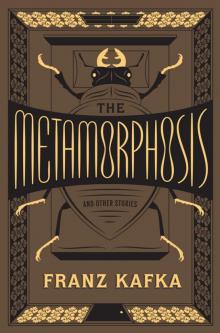- Home
- Franz Kafka
Sons Page 9
Sons Read online
Page 9
II
Not until it was twilight did Gregor awake out of a deep sleep, more like a swoon than a sleep. He would certainly have awoken of his own accord not much later, for he felt himself sufficiently well rested, but it seemed to him as if a fleeting step and a cautious shutting of the door leading into the hall had aroused him. The electric lights in the street cast a pale sheen here and there on the ceiling and the upper surfaces of the furniture, but down below, where he lay, it was dark. Slowly, awkwardly trying out his feelers, which he now first learned to appreciate, he pushed his way to the door to see what had been happening there. His left side felt like one single long, unpleasantly tense scar, and he had actually to limp on his two rows of legs. One little leg, moreover, had been severely damaged in the course of that morning’s events—it was almost a miracle that only one had been damaged—and trailed uselessly behind him.
He had reached the door before he discovered what had really drawn him to it: the smell of food. For there stood a bowl filled with fresh milk in which floated little slices of white bread. He could almost have laughed with joy, since he was now far hungrier than in the morning, and he dipped his head almost up to his eyes in the milk. But soon in disappointment he withdrew it again; not only did he find it difficult to eat because of his tender left side—and he could only eat with the cooperation of his whole snorting body—he did not like the milk either, although milk had been his favorite drink and that was certainly why his sister had set it there for him; indeed it was almost with repulsion that he turned away from the bowl and crawled back to the middle of the room.
He could see through the crack of the door that the gas was turned on in the living room, but while usually at this time his father made a habit of reading the afternoon newspaper in a loud voice to his mother and occasionally to his sister as well, not a sound was now to be heard. Well, perhaps his father had recently given up this habit of reading aloud, which his sister had mentioned so often in conversation and in her letters. But there was the same silence all around, although the apartment was certainly not empty of occupants. “What a quiet life our family leads,” said Gregor to himself, and as he sat there motionless staring into the darkness he felt great pride in the fact that he had been able to provide such a life for his parents and sister in such a fine apartment. But what if all the quiet, the comfort, the contentment were now to end in horror? To keep himself from being lost in such thoughts Gregor took refuge in movement and crawled back and forth in the room.
Once during the long evening one of the side doors was opened a little and quickly shut again, later the other side door too; someone had apparently wanted to come in and then thought better of it. Gregor now stationed himself immediately before the living room door, determined to persuade any hesitating visitor to come in or at least to discover who it might be; but the door was not opened again and he waited in vain. In the early morning, when the doors were locked, they had all wanted to come in, now that he had opened one door and the others had apparently been opened during the day, no one came in and even the keys were on the other side of the doors.
It was late at night before the gaslights were extinguished in the living room, and Gregor could easily tell that his parents and his sister had all stayed awake until then, for he could clearly hear the three of them stealing away on tiptoe. No one was likely to visit him, not until the morning, that was certain; so he had plenty of time to meditate at his leisure on how he was to rearrange his life. But the lofty, empty room in which he had to lie flat on the floor filled him with an apprehension he could not account for, since it had been his very own room for the past five years—and half-unconsciously, not without a slight feeling of shame, he turned from the door and scuttled under the sofa, where he felt comfortable at once, although his back was a little cramped and he could not lift his head up, and his only regret was that his body was too broad to get all of it under the sofa.
He stayed there all night, spending the time partly in a light slumber, from which his hunger kept waking him up with a start, and partly in worrying and sketching vague hopes, which all led to the same conclusion, that he must lie low for the present and, by exercising patience and the utmost consideration, help the family to bear the inconvenience he was bound to cause them in his present condition.
Very early in the morning—it was still almost night—Gregor had the chance to test the strength of his new resolutions, for his sister, nearly fully dressed, opened the door from the hall and peered in apprehensively. She did not see him at once, yet when she caught sight of him under the sofa—well, he had to be somewhere, he couldn’t have flown away, could he?—she was so startled that without being able to help it she slammed the door shut again. But as if regretting her behavior she opened the door again immediately and came in on tiptoe, as if she were visiting an invalid or even a stranger. Gregor had pushed his head forward to the very edge of the sofa and watched her. Would she notice that he had left the milk standing, and not for lack of hunger, and would she bring in some other kind of food more to his taste? If she did not do it of her own accord, he would rather starve than draw her attention to the fact, although he felt a wild impulse to dart out from under the sofa, throw himself at her feet, and beg her for something to eat. But his sister at once noticed, with surprise, that the bowl was still full, except for a little milk that had been spilled all around it, she lifted it immediately, not with her bare hands, true, but with a cloth and carried it away. Gregor was extremely curious to know what she would bring instead, and imagined all sorts of possibilities. Yet what she actually did next, in the goodness of her heart, he could never have guessed. To find out what he liked she brought him a whole selection of food, all set out on an old newspaper. There were old, half-decayed vegetables, bones from last night’s supper covered with a white sauce that had congealed; some raisins and almonds; a piece of cheese that Gregor would have pronounced inedible two days ago; a plain piece of bread, a buttered piece, and a piece both buttered and salted. Besides all that, she set down again the same bowl, into which she had poured some water, and which was apparently to be reserved for his exclusive use. And with great tact, knowing that Gregor would not eat in her presence, she withdrew quickly and even turned the key, to let him understand that he could make himself as comfortable as he liked. Gregor’s little legs all whirred in his rush to get to the food. His wounds must have healed completely, moreover, for he no longer felt incapacitated, which amazed him and made him reflect how more than a month ago he had cut one finger a little with a knife and was still suffering from the wound only the day before yesterday. Might it be that I am less sensitive now? he thought, and sucked greedily at the cheese, which more than any of the other delicacies attracted him at once, and strongly. One after another, and with tears of satisfaction in his eyes, he quickly devoured the cheese, the vegetables, and the sauce; the fresh food, on the other hand, had no charm for him, he could not even stand the smell of it and actually dragged away to some little distance the things he wanted to eat. He had long since finished his meal and was only lying lazily on the same spot when his sister turned the key slowly as a sign for him to retreat. That roused him at once, although he was nearly asleep, and he hurried under the sofa again. But it took considerable self-control for him to stay under the sofa, even for the short time his sister was in the room, since the large meal had swollen his body somewhat and he was so cramped he could hardly breathe. Slight attacks of breathlessness afflicted him and his eyes were bulging a little from their sockets as he watched his unsuspecting sister sweeping together with a broom not only the remains of what he had eaten but even the things he had not touched, as if these were now of no use to anyone, and hastily shoveling it all into a bucket, which she covered with a wooden lid and carried away. Hardly had she turned her back when Gregor came from under the sofa and stretched and puffed himself out.
In this manner Gregor was fed, once in the early morning while his parents and the maid were still asleep, and
a second time after they had all had their midday meal, for then his parents took a short nap and the girl could be sent out on some errand or other by his sister. Not that they would have wanted him to starve, of course, but perhaps they could not have endured learning more about his feeding than from hearsay; perhaps too his sister wanted to spare them such little anxieties wherever possible, since they had quite enough to bear as it was.
Under what pretext the doctor and the locksmith had been gotten rid of on that first morning Gregor could not discover, for since what he said was not understood by the others it never occurred to any of them, not even his sister, that he could understand what they said, and so whenever his sister came into his room he had to content himself with hearing her utter only a sigh now and then and an occasional appeal to the saints. Later on, when she had gotten a little used to the situation—of course she could never get completely used to it—Gregor would occasionally catch a remark which was kindly meant or could be so interpreted. “Well, he liked his dinner today,” she would say when Gregor had gobbled down all of his food; and when he had not eaten, which gradually happened more and more often, she would say almost sadly: “Everything’s been left untouched again.”
But although Gregor could get no news directly, he overheard a lot from the neighboring rooms, and as soon as voices were audible, he would run to the door of whichever room it was and press his whole body against it. In the first few days especially there was no conversation that did not concern him somehow, even if only indirectly. For two whole days there were family consultations at every mealtime about what should be done; but also between meals the same subject was discussed, for there were always at least two members of the family at home, since no one wanted to be alone in the apartment and to leave it altogether empty was unthinkable. And on the very first of these days the cook—it was not quite clear what and how much she knew of the situation—fell on her knees before his mother and begged permission to leave, and when she departed a quarter of an hour later gave thanks for her release with tears in her eyes as if this were the greatest blessing that could ever be conferred on her, and without any prompting swore a solemn oath that she would never say a single word to anyone about what had happened.
Now Gregor’s sister had to do the cooking too with her mother’s help; true, this did not amount to much, for they ate scarcely anything. Gregor was always hearing one of the family vainly urging another to eat and getting no answer but “Thanks, I’ve had all I want,” or something similar. Nor did they seem to be drinking anything either. Time and again his sister kept asking his father if he wouldn’t like some beer and kindly offered to go and fetch it herself, and when he didn’t answer suggested that she could ask the concierge to fetch it, so that he need feel no sense of obligation, but then a loud “No” came from his father and no more was said about it.
In the course of that very first day Gregor’s father explained the family’s financial position and prospects to both his mother and his sister. Now and then he rose from the table to get some document or notebook out of the small safe he had rescued from the collapse of his business five years earlier. One could hear him opening the complicated lock and taking papers out and shutting it again. These explanations were the first cheerful information Gregor had heard since his imprisonment. He had been of the opinion that nothing at all was left over from his father’s business, at least his father had never said anything to the contrary, and of course he had not asked him directly. At that time Gregor’s sole desire was to do his utmost to help the family to forget as soon as possible the catastrophe that had overwhelmed the business and thrown them all into a state of complete despair. And so he had set to work with unusual ardor and almost overnight had become a traveling salesman instead of a little clerk, with of course much greater chances of earning money, and his success was immediately transformed into hard cash which he could lay on the table before his amazed and happy family. These had been fine times, and they had never recurred, at least not with the same sense of glory, although later on Gregor had earned so much money that he was able to meet the expenses of the whole household and did so. They had simply gotten used to it, both the family and Gregor; the money was gratefully accepted and gladly given, but there was no special outpouring of warm feeling. With his sister alone had he remained intimate, and it was a secret plan of his that she, who, unlike himself, loved music and could play the violin movingly, should be sent next year to study at the Conservatory, despite the great expense that would entail and which would have to be made up in some other way. During his brief visits home the Conservatory was often mentioned in the talks he had with his sister, but always merely as a beautiful dream which could never come true, and his parents discouraged even these innocent references to it; yet Gregor had made up his mind firmly about it and meant to announce the fact with due solemnity on Christmas Day.
Such were the thoughts, completely futile in his present condition, that went through his head as he stood glued upright to the door and listening. Sometimes out of sheer weariness he could no longer pay attention and accidentally let his head fall against the door, but he always pulled himself together again at once, for even the slight sound his head made was audible next door and brought all conversation to a stop. “What can he be doing now?” his father would say after a while, obviously turning toward the door, and only then would the interrupted conversation gradually start up again.
Gregor was now informed as amply as he could wish—for his father tended to repeat himself in his explanations, partly because it was a long time since he had dealt with such matters and partly because his mother could not always grasp things at once—that a certain amount of money, not all that much really, had survived the wreck of their fortunes and had even increased a little because the dividends had not been touched meanwhile. And besides that, the money Gregor brought home every month—he had kept only a few thalers for himself—had never been quite used up and now amounted to a substantial sum. Behind the door Gregor nodded his head eagerly, delighted by this evidence of unexpected thrift and foresight. True, he could really have paid off some more of his father’s debts to the head of his firm with this extra money, and thus brought much nearer the day on which he could quit his job, but doubtless it was better the way his father had arranged it.
Yet this capital was by no means sufficient to let the family live on the interest from it; for one year, perhaps, or at the most two, they could live on the principal, that was all. It was simply a sum that ought not to be touched and should be kept for a rainy day; money for living expenses would have to be earned. Now his father was still healthy enough but an old man, and he had done no work for the past five years and could not be expected to exert himself; during these five years, the first years of leisure in his laborious though unsuccessful life, he had put on a lot of weight and become sluggish. And Gregor’s old mother, how was she to earn a living with her asthma, which troubled her even when she walked through the apartment and kept her lying on a sofa every other day panting for breath beside an open window? And was his sister to earn her bread, she who was still a child of seventeen and whose life hitherto had been so pleasant, consisting as it did in dressing herself nicely, sleeping long, helping with the housework, going out to a few modest entertainments, and above all playing the violin? At first whenever the need for earning money was mentioned Gregor let go of the door and threw himself down on the cool leather sofa beside it, he felt so hot with shame and grief.
Often he just lay there the long nights through without sleeping at all, scrabbling for hours on the leather. Or he worked himself up to the great effort of pushing an armchair to the window, then crawled up over the window-sill and, braced against the chair, leaned against the windowpanes, obviously in some recollection of the sense of freedom that looking out of a window always used to give him. For, in reality, day-by-day things that were only a little distance away were growing dimmer to his sight; the hospital across the street, which he use
d to curse for being all too often before his eyes, was now quite beyond his range of vision, and if he had not known that he lived on Charlotte Street, a quiet street but still a city street, he might have believed that his window looked out on a desert waste where gray sky and gray land blended indistinguishably into each other. His quick-witted sister only needed to observe twice that the armchair stood by the window; after that whenever she had tidied the room she always pushed the chair back to the same place at the window and even left the inner casements open.

 Diaries of Franz Kafka
Diaries of Franz Kafka Metamorphosis and Other Stories
Metamorphosis and Other Stories The Castle: A New Translation Based on the Restored Text
The Castle: A New Translation Based on the Restored Text The Complete Stories
The Complete Stories In the Penal Colony
In the Penal Colony The Trial
The Trial Amerika
Amerika The Burrow: Posthumously Published Short Fiction
The Burrow: Posthumously Published Short Fiction Sons
Sons Letters to Milena
Letters to Milena Investigations of a Dog: And Other Creatures
Investigations of a Dog: And Other Creatures Collected Stories
Collected Stories The Great Wall of China
The Great Wall of China The Burrow
The Burrow The Castle
The Castle The Meowmorphosis
The Meowmorphosis The Sons
The Sons The Lost Writings
The Lost Writings The Unhappiness of Being a Single Man
The Unhappiness of Being a Single Man Amerika: The Missing Person: A New Translation, Based on the Restored Text
Amerika: The Missing Person: A New Translation, Based on the Restored Text The Burrow: Posthumously Published Short Fiction (Penguin Modern Classics)
The Burrow: Posthumously Published Short Fiction (Penguin Modern Classics) The Diaries of Franz Kafka
The Diaries of Franz Kafka Investigations of a Dog
Investigations of a Dog The Metamorphosis and Other Stories
The Metamorphosis and Other Stories The Trial: A New Translation Based on the Restored Text
The Trial: A New Translation Based on the Restored Text